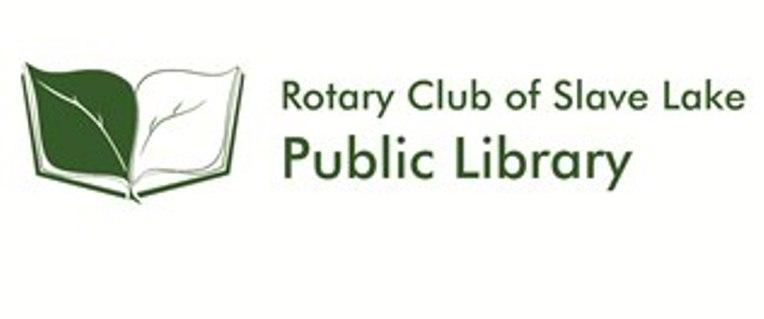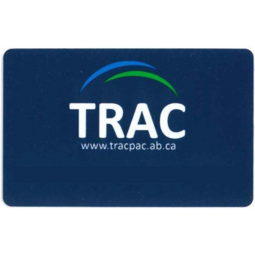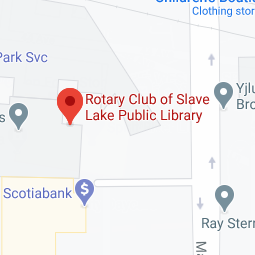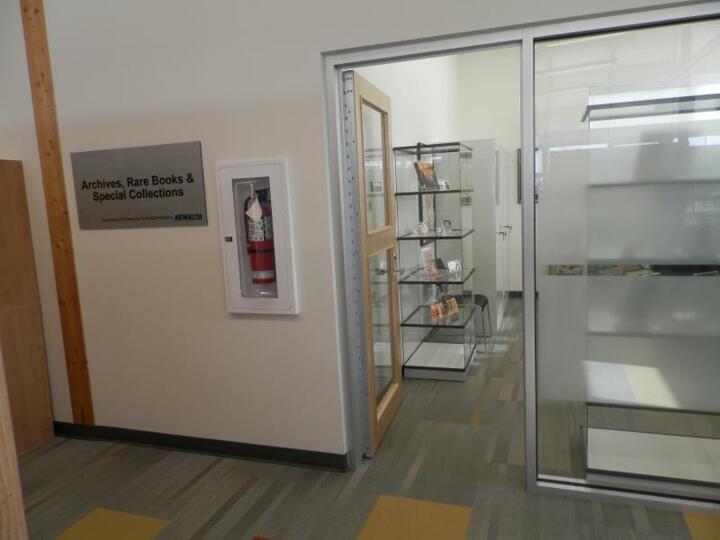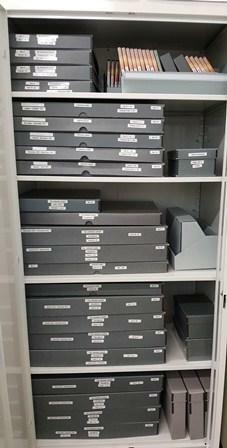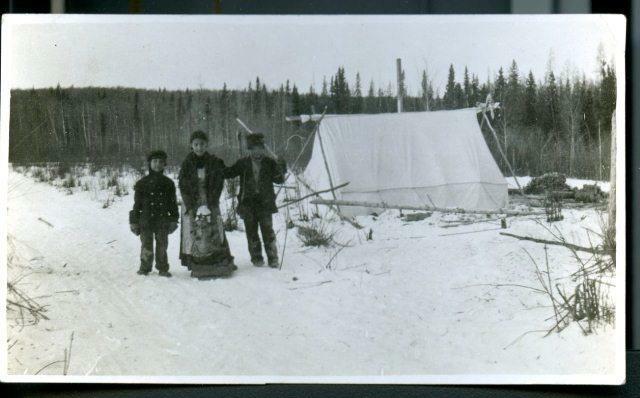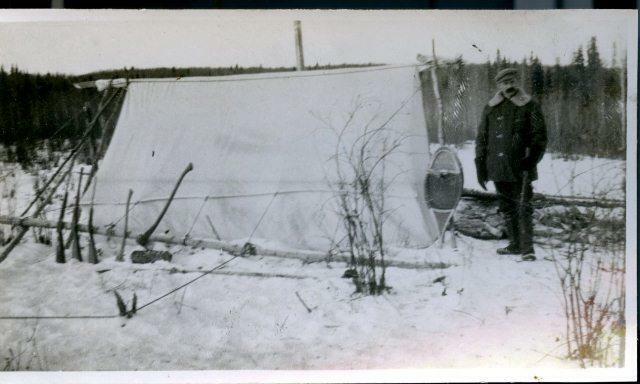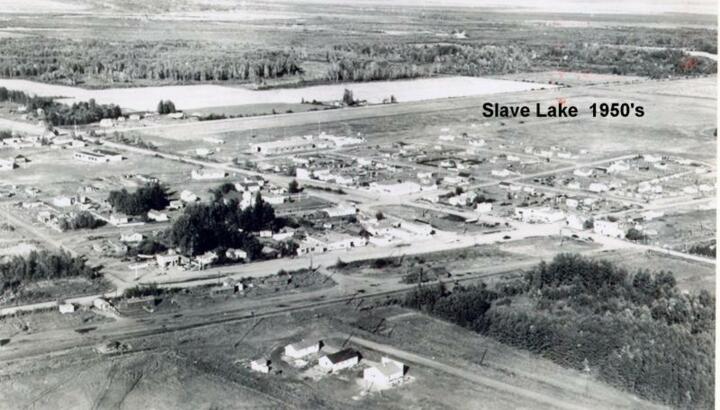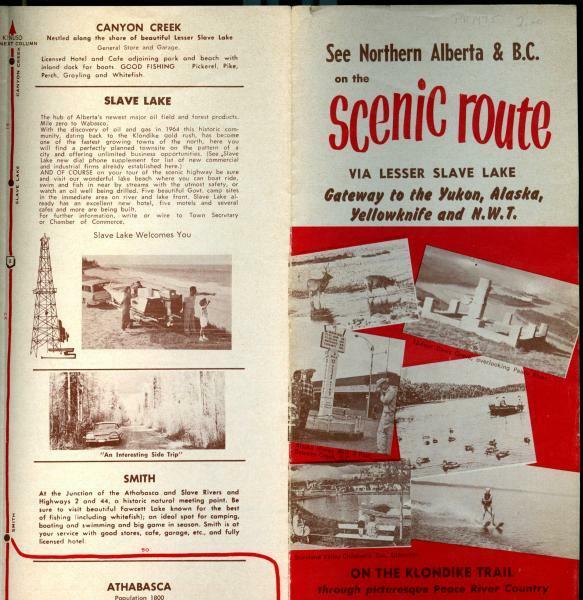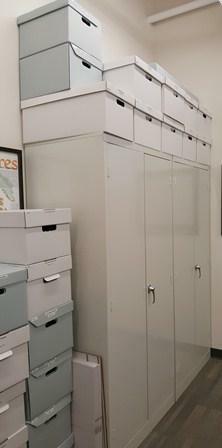Archives
‘Archives and records are important resources for individuals, organizations and the wider community. They provide evidence of, and information about, the actions of individuals organizations and communities and the environments in which those actions occurred. They extend and corroborate human and corporate memory and play a critical role in maintaining awareness of how the present is shaped by the past.’ –Laura A Miller
An Introduction: Rotary Club of Slave Lake Public Library Archives, Manuscripts & Special Collections
In May 2011, the Rotary Club of Slave Lake Public Library was destroyed by the fires that devastated the Town of Slave Lake and the surrounding area, including its’ small, newly established archives. In June 2013, the Library moved back to its original location after being in a temporary location since the 2011 fires. Shortly after relocating, the Library received a donation of $10,000 by the Slave Lake Fire Book Committee to start a new Archives, Rare books & Special Collections.
In light of the Slave Lake Fires of 2011 and in honour of the Slave Lake Fire Book Committees’ generous donation, the Archives seeks to acquire, preserve and make available records of historical value to the Town of Slave Lake and the surrounding area, as well as promote the appreciation and study of the Lesser Slave Lake region.
The Archives provide a safe and secure location to house the historical records of Slave Lake and the Lesser Slave Lake region. The Archives also provide a welcoming environment for the general public and encourages access and use of its records. The Archives is open to all members of the public during operating hours or by appointment.
Come and see the small but growing collection!
Latest Acquisition
The newest addition to the Slave Lake Archives comes from the Lesser Slave Lake Historical Society.
We received many new artifacts, newspapers, books, and historical town records! We are excitedly going through these items and adding them to our collections and display cases! Come by the Library to see some of these artifacts displayed and visit the Archive room (located near the fireplace) to browse through the rest of our collections!
- The Archives received a donation from the Alberta Legislative Library of the 1956-1960 editions of the Lesser Slave Lake Star.
- Lakeside Leader collection
- The Scope Collection
Donations
What are we looking for?
The Archives Rare books, and special collection of Slave Lake is growing and we want to include documents created by people or organizations as they go about their usual activities. Examples of these types of documents are:
- Correspondence - This donation could include letters, postcards, formal correspondence, greeting cards and telegrams.
- Minutes of meetings - These would have additional interest with handwritten notes in the margins.
- Contracts - Any legal documents as briefs, dispositions, inventories of estates or wills have archival value.
- Financial records - These reflect the economic climate when they were created. Other examples include ledgers, journals, bank statements, cheques, bills and receipts.
- Diaries - These are excellent records of social activities, perspectives and viewpoints. Memoirs and awards are also valuable. Scrapbooks are an excellent documentation of activities or events important to an individual.
- Photographs - Photographs of events and private lives are full of information, both of the subject and the background. These donations can include slides, negatives, movie and video tapes. When donating photographs please be prepared to help identify information related to persons, places, and events depicted in the photographs.
- Maps - Maps, charts and graphs define geography of a certain time.
- Recordings - These can be in several formats including wax discs, cassette tapes and compact discs.
- Printed material - Newspapers, flyers, brochures, proofs, programs and clippings all contain information to aid the researcher.
- Digital age - Technology leaps ahead so we also must include digital records, pictures and video.
Thank you for considering adding your documents and collections to the Archives Rare books, and special collection of Slave Lake. What we are able to preserve will affect how people view and understand our past.
FAQs:
What do you mean by records?
We look for materials which document the activities of the organization: minutes, letters, reports, photographs and publications, for example.
My organization opposes many government actions and policies. Why would I give my files to a Town department?
Our professional staff adhere to a code of ethics, and value objectivity above our personal biases or those of Town officials.
We need to use our records. We don't want to give them away.
We do not wish to take your current records. We can work out an appropriate time delay so that you will retain the records you need, and only older records be donated to the Archives. You will still be able to view the older records at the Archives.
We discuss some very sensitive issues at our meetings. It's too early for anyone else to read our minutes and internal reports.
We can work with you to determine a suitable time frame for restricting the records, so that only those to whom you have given written permission may view certain materials. We only ask that records not be restricted forever.
What do we get out of this?
Your records will be organized and stored securely in a preservation environment. The work of your organization will be known and valued by future generations.
Our Standards and Guidelines
The Archives follows professional Archival standards and the Association of Canadian Archivists’ ‘A code of Ethics for Archivists in Canada.’
Privacy restrictions:
All records are maintained by the Archives are subject to Freedom of Information and Privacy (FOIP) legislation and restrictions may apply. The Archives will inform researchers of any restrictions to access and use on the records during their visit.
Reproductions & copyright:
Reproductions of photographs or other material in print or digital form are available for purchase and use according to specific terms and restrictions. Reproductions (i.e. photocopying and scanning) will only be performed by the Archivist and library staff. Please consult the Reproductions & Copyright on the next page for the fee schedule and guidelines.
Access and use guidelines
As per the Archives Preservation policy (pg. # of the Processing manual), researchers are must follow these guidelines at all times when using the material at the Archives:
- All researchers wanting access to records must fill out a Researcher Registration form.
- Researchers can submit a material request slip for material they would like access to.
- Researchers may view the material in the Archives Room or in another area instructed by the Archivist.
- Pencils must be used in the Archives room, ink is not permitted.
- When handling the records, keep documents in the same order that they came in the box. Never re-shelve or reorganize the material.
- No food or beverage is allowed in the Archives Room and library.
- Material may not be removed from the Archives.
- Use of a camera is not permitted without consent by the Archivist. Flash or enhanced light is never permitted.
- No backpacks, jackets or coats are allowed in the Archives room. Researchers can store their belongings in a designated storage area of the Library instructed by the Archivist or library staff.
- Have clean and lotion-free hands when handling photographs.
- Use two hands or a temporary support like a weight when moving material.
Reproductions & Copyright
The Archives offer reproduction services to the general public.
Adhering to the Fair Dealing provisions of the Copyright Act, the Archives will provide single copies of records for the purposes of research, private study, education, criticism, reporting and review. For any other purposes outside of exemptions set by the provisions of Fair Dealing, please contact the Archivist as authorization from the copyright owner of the work may be required.
If reproduction services are requested, please note that:
- Reproductions will only be made if the process does not damage the physical integrity of the record. Any record in a fragile state will not be reproduced.
- Reproductions will not be made that violates the Copyright Act, or the access policies set the Rotary club of Slave Lake Public Library.
- Archival or secondary resources will not be loaned to be reproduced outside of the Archives.
- Payment must be received first by the Archives before Reproduction Services can commence
- Payment may be made by cash, cheque, or debit payable to the Rotary Club of Slave Lake Public Library.
Ways to get involved:
1. Visit the Archives at the Rotary Club of Slave Lake Public Library during the operating hours of the archives.
2. Consider becoming a donor to the Archives, and donate your records to us.
3. Consider lending your material to us. Depending on the type and nature of the material, we can showcase your material as well as make a digital copy for desktop clients.
4. Tell your family and friends about us.
Mandate of the Archives
1. To showcase and preserve the historical records of the Town of Slave Lake and the surrounding area.
2. To promote the appreciation and study of the history of the Lesser Slave Lake region.
3. To create a public Archives to capture the past and future events of the Lesser Slave Lake region.
Genealogy and History Links
Genealogy Databases
-
Ancestry.ca
A subscription-based online genealogical research service providing access to census, vital statistics, and more to help in family history research. -
Resources – Forgotten Alberta
The primary purpose and function of this website is to connect people so that they can help each other and share genealogical research. -
Genealogy | City of Vancouver
Investigate your West Coast family history - https://www.metisnationdatabase.ca/ Metis National Historic Database
History links
-
Provincial Archives of Alberta | Provincial Archives of Alberta
Use this link to search over 10,000 descriptions of archival records held in Alberta Archives: Archives Network of Alberta - contains descriptions of archival records held in Alberta's archives; Alberta InSight - database of digitized photographs; Alberta InWord - database of digitized textual records (diaries, letters, etc.); Repositories Database - contains contact information for member institutions - Global Genealogy
- U.S. National Archives Census search
- Newspapers (ualberta.ca) Alberta newspapers
Tips on Preservation of Family Heirlooms
- https://provincialarchives.alberta.ca/who-we-are/we-preserve/personal-archives-preservation-guide
- https://www.youtube.com/watch?v=C1Kqkbz-LyA How to care for your photographs
Contact
Lyndsey Carmichael – Archivist
Office Hours:
Mondays and Tuesdays - 10:00am to 4:00 pm
Or by appointment
Email: archivist@slavelakelibrary.ab.ca
Phone: 780-849-5250
Mail: Rotary Club of Slave Lake Public Library
Box 540
Slave Lake Alberta
T0G 2A0
‘An Archive will enable us to better comprehend the past, understand the present and prepare for the future’

